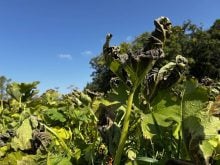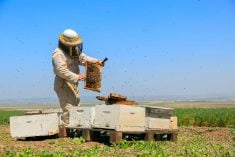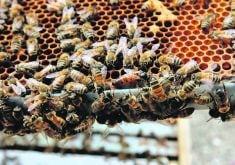Reuters – Extreme weather events in Chile, including major recent floods and wildfires earlier this year, are devastating colonies of the humble bee, a key pollinator for crops of avocados and almonds in one of the global South’s key food-producing countries.
Heavy rainfall has caused floods that have blocked roads and prompted evacuations in the centre of the country in what has been described as the worst weather front in a decade. That follows major fires at the start of the year.
“We were affected by the fires and now the floods,” said Mario Flores, president of the National Beekeeping Movement (Monachi).
Read Also

AAFC organic research program cut
Canada’s organic sector says the loss of a federal organic research program at Swift Current, Sask., will set the industry back.
Flores added that over 3,000 beehives were affected in late June by heavy rains in Chile’s south-central region.
“The situation we are experiencing today is critical for the national beekeeping industry,” he said.
Chile’s bee population, hit hard in recent years by drought, is important for pollinating many of the South
American country’s export crops including cherries, blueberries and apples, part of a multibillion-dollar food industry.
The country is also one of Canada’s sources for imported boxed bees, along with nations such as Australia and New Zealand.
Losses have mounted during recent floods, beekeeper Carlos Nunez said. About 300 of his 500 hives were ruined after the Cachapoal River broke its banks in a province to the south of Chile’s capital, Santiago.
“It was a total loss. What was saved, we are going to see if it can be recovered,” he said.
The government has decreed an agricultural emergency in areas affected by the floods to financially help farmers, particularly from Santiago to the southern Biobio region.
“Whatever [help] we get will be welcome because we have been having problems in the beekeeping sector for a long time now, with the fires in the summer, the honey exportation, the fake honey competition,” said Nunez.
“We are trying to keep our heads up and whatever help we can get will be good.”















